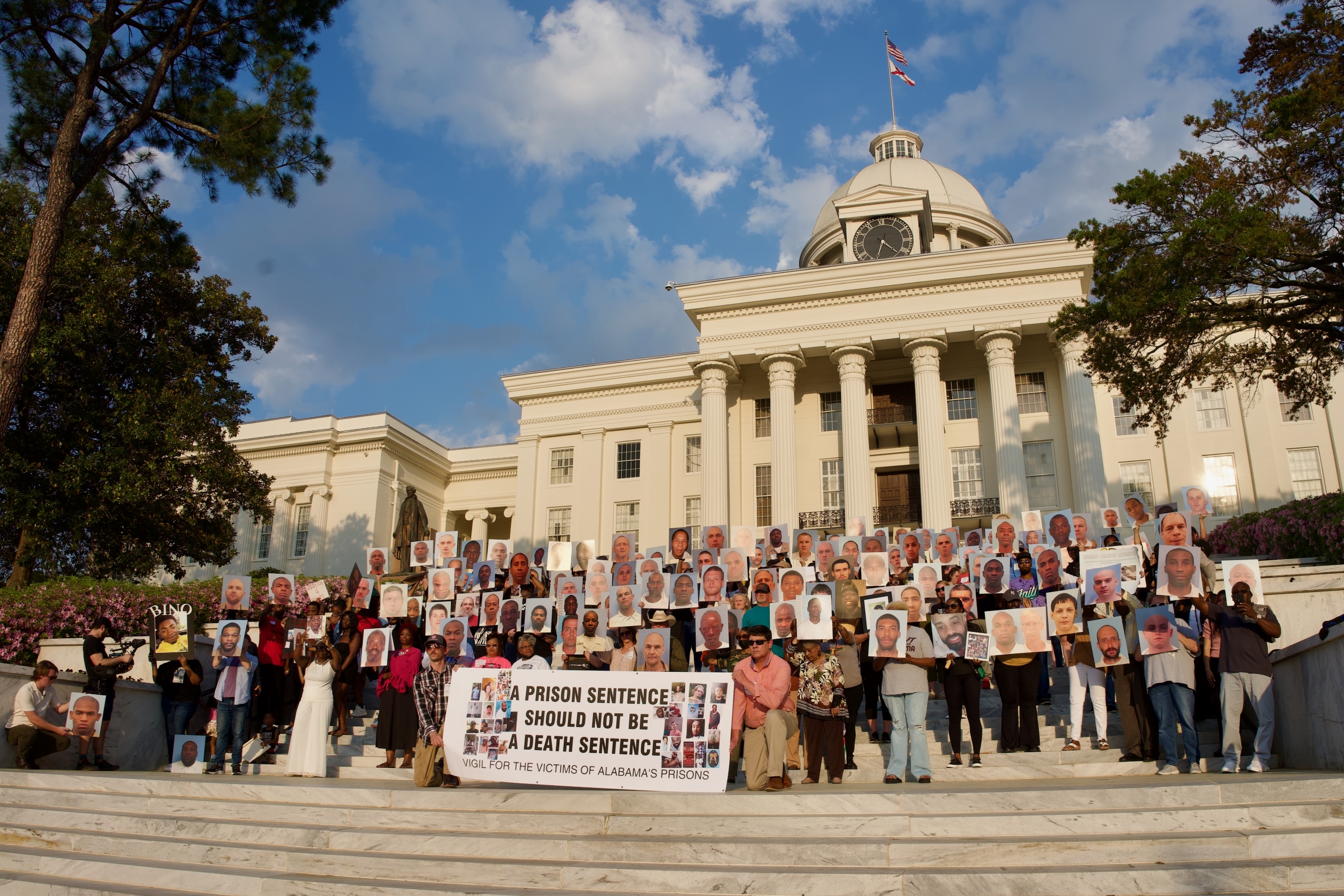Perhaps a hundred or more families, friends, and loved ones of incarcerated individuals gathered on the front steps of the Alabama State Capitol on Tuesday and later marched to Dexter Avenue King Memorial Baptist Church in downtown Montgomery for a candlelight vigil in honor of those who have died in state custody over the recent years.
Demonstrators carried enlarged photos of those incarcerated individuals who were murdered, committed suicide, overdosed on drugs, or were made the victim of fatal officer abuse during their time in the Alabama correctional system.
According to Alabama Appleseed, the Alabama Department of Corrections recorded a historic 266 fatalities in state facilities in 2022 – the largest loss of life in the history of state corrections since at least 2002. In the first two months of 2023, at least 29 incarcerated individuals, all men, have died in state custody, according to previous statements from the ADOC.
The state of Alabama not only has the highest in-custody death rate in U.S., but Alabama prisons hold the highest murder rate and the highest suicide rate of any state in the union, according to Lauren Faraino, director of The Woods Foundation, who spoke before the assemblage on the state capitol steps this Tuesday.
“We are here today to tell them: A prison sentence should never be a death sentence,” Faraino said. “The faces on these photographs are just some of the preventable deaths that occurred in Alabama Department of Corrections custody since the U.S. Department of Justice found the entire prison system to be unconstitutional.”
After standing for photos on the capitol steps, the gathering marched along Dexter Avenue towards King Memorial Baptist Church with Callie Greer, a community navigator with Alabama Appleseed, leading the group in the freedom song “Ain’t Gonna Let Nobody Turn me ‘Round.”
Circling around the raised front steps of Dexter Avenue King Memorial Baptist Church, individual speakers testified to the loss of sons, brothers, uncles, and loved ones in state prisons. An overwhelming sense of frustration, heartache, and anger at the failure of policymakers and correctional administrators to fully address the ever-expanding crises within the state correctional system permeated through the entire crowd with each testimonial.
“My son literally had to kill himself to get out of prison,” one mother said from the podium.
Speakers included the nephew Albert Jackson Sorrells, the mother of Reginald Alford, and the sister of Jerry Hammond, among others.
Earlier on Tuesday, Allison Macintyre and Jennette Thomas spoke to APR about their brother Jerry Hammond, who died of cancer at Limestone Correctional Facility in June of 2022. Thomas recalled visiting Hammond the day before his death in hospice care with the facility.
“When I walked inside the facility and saw my brother, I almost passed out,” Thomas said. “He was skin and bone.”
His health had further deteriorated due to a major fall Hammond experienced following surgery on his neck and shoulder in the months before his death, according to the pair. He began losing his sight and having trouble remembering things.
“He said, ‘when I fell, I thought a bomb had hit me’,” Macintyre said. “I said, ‘what did they give you?’ and he said, ‘an aspirin.'”
He would die on June. 17. Hammond passed a week before his 70th birthday, according to his sisters.
The gathering and vigil on Tuesday coincided with Alabama Governor Kay Ivey’s State of the State address and the first official day of the state Legislature’s regular session. State policymakers and officials, including Lt. Gov. Will Ainsworth, are backing legislation filed by state Sen. April Weaver, R-Alabaster, that would further restrict access to good time incentives for incarcerated individuals.
The bill had its genesis in the aftermath of the fatal shooting of Bibb County sheriff’s deputy Brad Johnson. That incident involved capital murder suspect Austin Patrick Hall, who was inexplicably released from state custody on good-time served despite numerous infractions he committed both in and outside prison.
Hall’s release was likely due to missteps and inaction from officials at both the state and county level, along with the ADOC appearing to ignore Alabama state code in failing to forfeit Hall’s accrued good time served after he escaped from a Camden work release facility three years before the officer-involved shooting in Bibb County.



















































